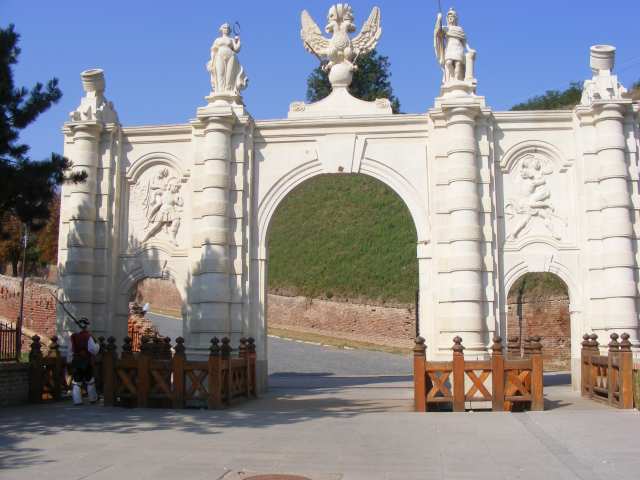Alba Iulia 100 Years Ago
On 1 December 1918, the city of Alba Iulia, in what is now central Romania, was the gathering place for the National Assembly of Romanians in Transylvania, who decided that the future of Romanians in Austria-Hungary was with Romania

Steliu Lambru, 03.12.2018, 13:10
The Romanian National Council, made up of 6 members of the Romanian National Party and 6 Socialist Party members, decided that the future of Romanians in Austria-Hungary was with Romania.
In Alba Iulia, 1,228 deputies were elected to vote the resolution that united Transylvania with the Kingdom of Romania.
This moment of national enthusiasm was described, a century after the events, by historian and political science professor Daniel Barbu, with the School of Political and Administrative Science of Bucharest University: “What happened back then was that two forms of sovereignty clashed directly, dramatically. Early Roman law had two notions that it did not see as contradictory, but outright complementary. It saw them engaged in a permanent debate. There was the notion of maiestas, the sovereignty of the people, and imperium, the sovereignty of magistrates, of the state, the Senate, the consuls, the censors, and so forth. In 1918, in early winter in Transylvania, resuscitating this Roman terminology, Transylvania was a stateless province, because the Hungarian crown was stuck, it had no place to move. When I say the Crown, I mean its magistrates, prefects, gendarmes, and everyone who provided public order and sovereignty for the nation of Greater Hungary, exercised as an imperium by Parliament, the king and the delegates of the government in regions and counties. There was no such authority at the time.”
In all this confusion, Romanians reacted on the lines of self-government. Here is Daniel Barbu: “However, at that time we had an outburst of maiestas, the sovereignty of the people. To the point, Romanian ethnics, who fell mostly with two parties, with relatively equal representation in the Parliament in Budapest, with equal influence, the National Romanian Party and the Romanian wing of the Social Democratic Party in Hungary, organized elections. As far as I know, it was the only election that was not organized by a government or public authority. It was organized, as they say for they last 40 years or so, by civil society. I dont mean to say that it was a very democratic process. Micro-historical data that we have regarding the election of delegates from each locality show that what was used was a Roman type procedure, a sort of acclamation. Normally, three or four notable figures in the village, such as the priest, landowner, if they were Romanian, the notary public, the teacher, or a wealthier peasant, were picked by acclamation, by consensus, and given authority to represent the entire local community. It was a laborious process, it lasted almost a month, and it could have generated a democratic mentality. Where else have you seen a relatively large group of people organize themselves by themselves, with no prefect, gendarmes, no police, no assistance, encouragement, or financing from a public authority, in an electoral process that led to a formative assembly, such as that in Alba Iulia?”
However, those were troubled times, as the end of WWI had brought to the surface expectations and reactions that had been repressed previously. Daniel Barbu said that democracy could have been built on new foundations then, but it was not to be so: “Without a doubt, the constituent assembly in Alba Iulia, with its unanimous resolution, also passed by acclamation, did not use voting. It was speaking about unity, and accepted the union with the Kingdom of Romania, but under certain conditions. It spoke about instituting a clean, democratic and authentic regime. One question emerges: were the participants in the Assembly in Alba Iulia, at least those who wrote the resolution and submitted it for acclamation, were they democrats? They were clearly Romanian patriots. They were people with a lot of experience in Parliament, they had the practice and the science of politics. My guess is that they were democrats, which they proved in the months to come. On December 6, the Romanian army took over Transylvania. It was instrumental in drawing up the borders, and, more importantly, restored order in the country. We have a very clear testimony, Ion Lapedatu talks about that in his memoir, quoting his diary from those days, where he wrote that the villages are in motion. When we talk about Soviet communes, we think only of Budapest and the Hungary beyond the Tisa, but in fact all of Europe, including England, was stricken by revolutionary fervour. For months on end, cities such as Turin, Munich, Berlin, were led, under a red flag, by soldier and worker associations. Similar things were happening in Transylvania. The villages are in motion, Lapedatu complained. What did that mean? The peasants were divvying up the lands, and that did not always mean that the land owner was Hungarian. Peasants were going to the notary public and burned the ledgers with their debt. There was an entire rural movement that emulated revolution.”
100 years ago, Alba Iulia was the center of the Romanian movement in Transylvania. That end of year was glorious, but historians say that the events did not flow to a clearly anticipated outcome.




























